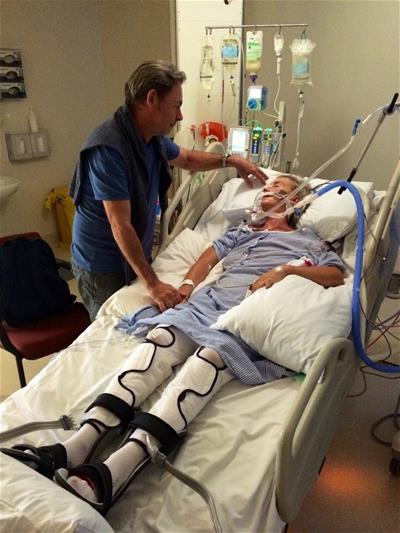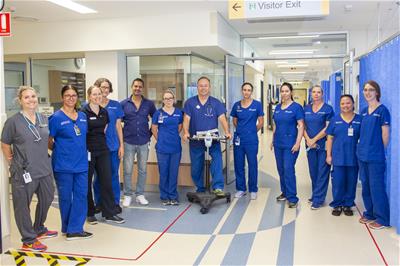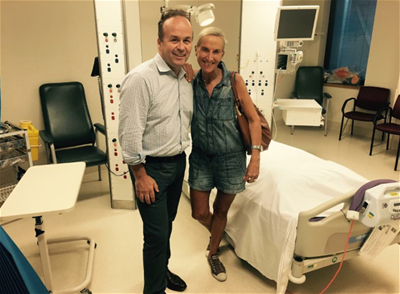It was Easter 2015 when Brisbane journalist, Lizzie Wilson, began feeling unwell with chronic pain in her left ear.
She had been busy delivering Easter eggs to all the kids in her neighbourhood, and was on a career high having just achieved her first front-page story with London’s The Sunday Times newspaper.
 Lizzie was 52 years old, a non-smoker, moderate drinker, happily married and the fittest she had ever been when she was admitted to the Intensive Care Unit (ICU) at St Andrew’s War Memorial Hospital.
Lizzie was 52 years old, a non-smoker, moderate drinker, happily married and the fittest she had ever been when she was admitted to the Intensive Care Unit (ICU) at St Andrew’s War Memorial Hospital.
Looking back now, Lizzie has no recollection of those weeks prior to ending up in the care of the team at St Andrew’s.
“My husband, Tertius, could see I was not in good shape and made a call to a friend who is also a nurse for advice. She told him to get me to St Andrew’s immediately, a decision that would ultimately save my life,” Lizzie said.
“Initially the Emergency doctors presumed a mastoid sinus infection, and by all reports I appeared fine while in the Emergency Centre. Overnight I deteriorated and by the following morning I was displaying bizarre behaviour,” she said.
Director of Intensive Care, Professor John Fraser, was called to urgently review Lizzie’s condition.
“Professor Fraser saw I was slipping into a coma and took me to ICU concerned that my brain was swelling rapidly due to something they couldn’t identify,” Lizzie said.
“I slipped deeper into a coma, at which point Professor Fraser and the ICU team put me on life support and gave me medication to reduce the brain pressure.
“I was rushed in for an urgent CT scan of the head which showed an infection from sinus had spread and the bacteria had entered my brain tissue.
“According to Professor Fraser, this was an uncommon condition, and combined with my rapid deterioration, they had very real concerns I was not going to make it,” she said.
Lizzie would spend two weeks in St Andrew’s ICU, including 10 days in a coma, before embarking on the gruelling road to rehabilitation which lay ahead.
“Laying there in room 15 of the Intensive Care Unit, surrounded by so much love, kindness and care, I figured out early on if the doctors were fighting that hard to save me, I too had to fight – I had far too much to live for,” Lizzie said.
 “I was put into what they call the ‘silent room’ to give my dear husband Tertius and my family as much privacy as possible, and to give my brain the rest it needed. It was touch-and-go,” she said.
“I was put into what they call the ‘silent room’ to give my dear husband Tertius and my family as much privacy as possible, and to give my brain the rest it needed. It was touch-and-go,” she said.
But Lizzie recovered faster than expected and after several investigations doctors were able to diagnose a severe case of bacterial meningitis.
“Once we knew I’d been hit with one of the worst cases of bacterial meningitis, the team knew they’d picked the right treatment from when I was first admitted, which ultimately saved my life,” Lizzie explained.
“Coming out of the coma will remain one of the most memorable moments of my life. I now know that when I came off life support, the ICU team led out a collective cheer.
“What a wonderful scene when I opened my eyes to all these happy smiling faces. Professor Fraser has since reminded me that I didn’t stop talking, something Tertius explained was completely normal!”
While doctors were confident any cognitive damage would be temporary, the team at St Andrew’s worked hard to kick-start Lizzie’s recovery.
“My recovery from the outset has been nothing short of a miracle. I essentially had to learn to walk and talk again,” Lizzie said.
“In my case, I was blessed to have the A-Team caring for me, including infectious diseases physician Professor David Paterson, neurologist Dr Stephen Read, and some of the best nurses and allied health professionals in the country.
 “From the moment I was admitted, my husband, family and friends were embraced by the amazing support team, who were never too far away to give them the comfort and care they needed.
“From the moment I was admitted, my husband, family and friends were embraced by the amazing support team, who were never too far away to give them the comfort and care they needed.
“Tertius was particularly touched by the kindness he received from the chaplains and pastoral carers who counselled him through some of the darkest days,” she said.
Lizzie says she is now reminded every day that health really is our best wealth.
“Room 15 remains a very special place for me. Over the past seven years, I’ve returned to room 15, where I’ve sat with John and been visited by the same team members who worked tirelessly around the clock to save my life,” Lizzie said.
“I now know they kept a daily vigil outside my room praying I would pull through. It’s as important for them to see me today, as it is for me to go back and pay tribute to them.
“I’ve been given a second chance, all thanks to the courageous team at St Andrew’s ICU.”
Please donate this Christmas to support St Andrew’s War Memorial Hospital and help us continue providing exceptional care for critically ill patients at St Andrew’s Intensive Care Unit.
For more, please email fundraising@ucareqld.com.au or call 1800 961 441.